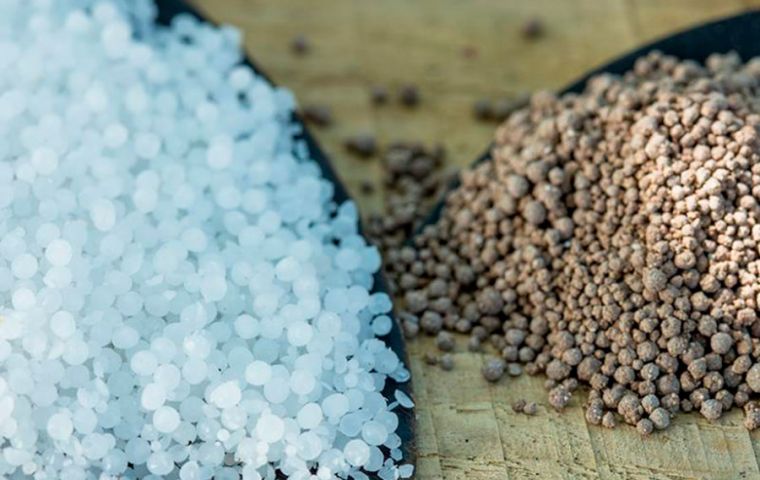MercoPress. South Atlantic News Agency
Brazil outlines 30-year plan to cut fertilizer overseas dependency
 Have a production capacity of 4.2 million tons of phosphate nutrients; production was between 1.7 and 2 million tons/year in the last five years
Have a production capacity of 4.2 million tons of phosphate nutrients; production was between 1.7 and 2 million tons/year in the last five years Agricultural power Brazil faced with an insufficient stable supply of fertilizers for its farmers, and given the current volatility of international prices because of the war in Ukraine has made public the goals of its National Fertilizer Plan, which includes some sharing with Mercosur partners.
Representatives from the ministries of Economy, Agriculture, Mines and Energy, Infrastructure, and the Special Secretariat for Strategic Affairs helped formulate the plan, although the mastermind behind the program has been Luis Rangel, Director of Programs at the Ministry of Agriculture.
“The national fertilizer plan is a long-term plan, a 30-year infrastructure transformation plan […] we intend to reduce the national dependence on imported fertilizers from 85% to around 50% or 55%,” Rangel said.
“The understanding of the PNF is that, without its implementation, the country will only increase its dependence on imported fertilizers,” says the PNF draft text .According to 2020 data elaborated by PNF, Brazil’s reliance on nitrogen, phosphate, and potassium is estimated to be 95.7%, 72%, and 96.4%, respectively.
The plan outlines five strategic objectives: to modernize, reactivate and expand existing fertilizer plants; improve the business environment to attract investments in the fertilizer production chain; promote competitive advantages in the national fertilizer production chain; expand investments in RD&I (Research, Development, and Innovation); adapt the existing infrastructure to allow the integration of logistic hubs and increase the feasibility of fertilizer operations.
PNF objectives for 2030
• Have the capacity to produce 1.9 million tons of nitrogen (estimated production in 2020 of 224 thousand tons);
• Have a production capacity of 4.2 million tons of phosphate nutrients (production was between 1.7 and 2 million tons/year in the last five years);
• Increase the national output of potassium oxide to 2 million tons (estimate production was of 250 thousand tons in 2020);
• Install at least two nitrogen fertilizer production companies;
• Attract at least R$ 10 billion to the construction of nitrogen fertilizer plants;
• Increase the number of phosphate-based fertilizer factories from 5 to 7 units, bringing the total to ten by 2040;
• increase the number of potash factories from 5 to 10 units, bringing the total to 20 by 2040;
And by 2050
• Increase the capacity to produce nitrogen to 2.8 million tons
• Increase the ability to produce phosphate nutrients to 9.2 million tons
• Attain a production capacity of 6 million tons of potassium oxide;
• Install at least four more nitrogen fertilizer-producing companies;
• Attract at least another R$ 20 billion from 2030 to 2050 in constructing nitrogen fertilizer plants.
In addition to expanding the national fertilizer manufacturing portfolio, the plan proposes strengthening international cooperation and “promoting the creation of a South American fertilizer industry council within Mercosur” and “enabling bilateral agreements until 2025 for increased access to Bolivian and Argentine natural gas to be used in the production of fertilizers.” .
In terms of financing, the text mentions instruments like fundraising in capital markets; Bank credit; credit lines from the National Bank for Economic and Social Development (BNDES); resources from the Financier of Studies and Projects (Finep); non-refundable funds in the research and innovation segment of the Empresa Brasileira de Pesquisa e Inovação Industrial (Embrapii).
As for the management and monitoring of these objectives, the document suggests the creation of the National Council on Fertilizers and Plant Nutrition (Confert), which the Federal Executive Branch will make up, including the Ministries of Agriculture, Economy, Mines and Energy, and Infrastructure, as well as people appointed by the National Forum of State Governors, plus representatives from the national fertilizer industry and farmers' organizations.




Top Comments
Disclaimer & comment rules-

Read all comments“Has made public the goals of its National Fertilizer Plan, which includes some sharing with Mercosur partners.”
Mar 14th, 2022 - 05:37 pm 0Just contact Argentina, they have a limitless supply.
Commenting for this story is now closed.
If you have a Facebook account, become a fan and comment on our Facebook Page!